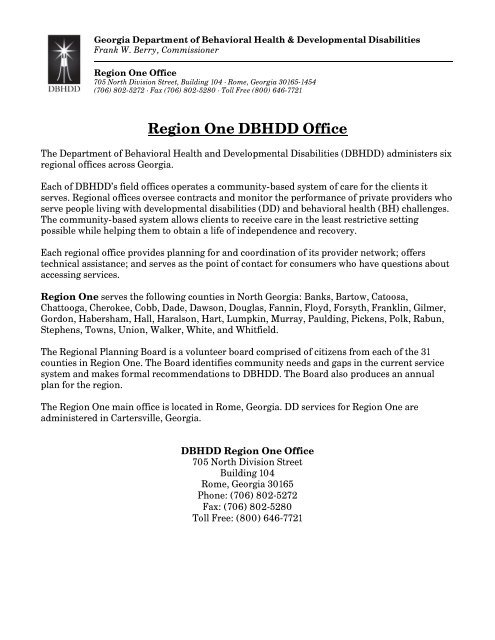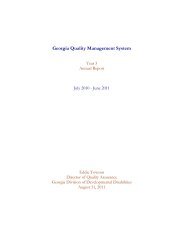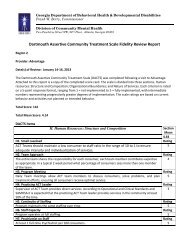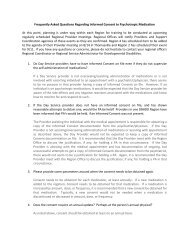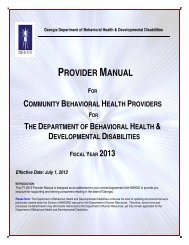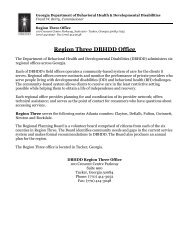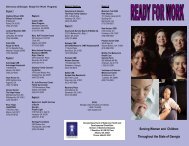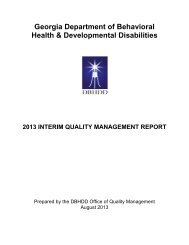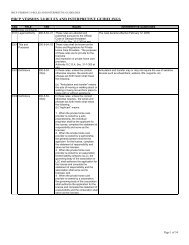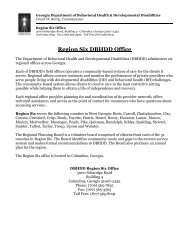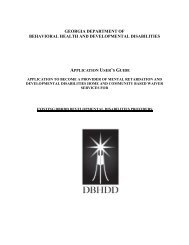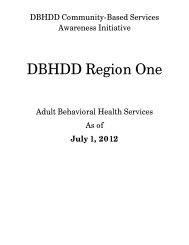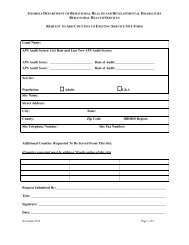Region One DBHDD Office - Department of Behavioral Health and ...
Region One DBHDD Office - Department of Behavioral Health and ...
Region One DBHDD Office - Department of Behavioral Health and ...
You also want an ePaper? Increase the reach of your titles
YUMPU automatically turns print PDFs into web optimized ePapers that Google loves.
Georgia <strong>Department</strong> <strong>of</strong> <strong>Behavioral</strong> <strong>Health</strong> & Developmental Disabilities<br />
Frank W. Berry, Commissioner<br />
<strong>Region</strong> <strong>One</strong> <strong>Office</strong><br />
705 North Division Street, Building 104 · Rome, Georgia 30165-1454<br />
(706) 802-5272 · Fax (706) 802-5280 · Toll Free (800) 646-7721<br />
<strong>Region</strong> <strong>One</strong> <strong>DBHDD</strong> <strong>Office</strong><br />
The <strong>Department</strong> <strong>of</strong> <strong>Behavioral</strong> <strong>Health</strong> <strong>and</strong> Developmental Disabilities (<strong>DBHDD</strong>) administers six<br />
regional <strong>of</strong>fices across Georgia.<br />
Each <strong>of</strong> <strong>DBHDD</strong>’s field <strong>of</strong>fices operates a community-based system <strong>of</strong> care for the clients it<br />
serves. <strong>Region</strong>al <strong>of</strong>fices oversee contracts <strong>and</strong> monitor the performance <strong>of</strong> private providers who<br />
serve people living with developmental disabilities (DD) <strong>and</strong> behavioral health (BH) challenges.<br />
The community-based system allows clients to receive care in the least restrictive setting<br />
possible while helping them to obtain a life <strong>of</strong> independence <strong>and</strong> recovery.<br />
Each regional <strong>of</strong>fice provides planning for <strong>and</strong> coordination <strong>of</strong> its provider network; <strong>of</strong>fers<br />
technical assistance; <strong>and</strong> serves as the point <strong>of</strong> contact for consumers who have questions about<br />
accessing services.<br />
<strong>Region</strong> <strong>One</strong> serves the following counties in North Georgia: Banks, Bartow, Catoosa,<br />
Chattooga, Cherokee, Cobb, Dade, Dawson, Douglas, Fannin, Floyd, Forsyth, Franklin, Gilmer,<br />
Gordon, Habersham, Hall, Haralson, Hart, Lumpkin, Murray, Paulding, Pickens, Polk, Rabun,<br />
Stephens, Towns, Union, Walker, White, <strong>and</strong> Whitfield.<br />
The <strong>Region</strong>al Planning Board is a volunteer board comprised <strong>of</strong> citizens from each <strong>of</strong> the 31<br />
counties in <strong>Region</strong> <strong>One</strong>. The Board identifies community needs <strong>and</strong> gaps in the current service<br />
system <strong>and</strong> makes formal recommendations to <strong>DBHDD</strong>. The Board also produces an annual<br />
plan for the region.<br />
The <strong>Region</strong> <strong>One</strong> main <strong>of</strong>fice is located in Rome, Georgia. DD services for <strong>Region</strong> <strong>One</strong> are<br />
administered in Cartersville, Georgia.<br />
<strong>DBHDD</strong> <strong>Region</strong> <strong>One</strong> <strong>Office</strong><br />
705 North Division Street<br />
Building 104<br />
Rome, Georgia 30165<br />
Phone: (706) 802‐5272<br />
Fax: (706) 802‐5280<br />
Toll Free: (800) 646‐7721
Georgia <strong>Department</strong> <strong>of</strong> <strong>Behavioral</strong> <strong>Health</strong> & Developmental Disabilities<br />
Frank W. Berry, Commissioner<br />
<strong>Region</strong> <strong>One</strong> <strong>Office</strong><br />
705 North Division Street, Building 104 · Rome, Georgia 30165-1454<br />
(706) 802-5272 · Fax (706) 802-5280 · Toll Free (800) 646-7721<br />
<strong>Region</strong> <strong>One</strong> <strong>DBHDD</strong> <strong>Office</strong><br />
Contact Information<br />
<strong>Region</strong>al Coordinator<br />
Charles Fetner<br />
(706) 802‐5272<br />
cafetner@dbhdd.ga.gov<br />
<strong>Behavioral</strong> <strong>Health</strong> <strong>Region</strong>al Services Administrator<br />
Debbie Atkins<br />
(706) 802‐5272<br />
deatkins@dbhdd.ga.gov<br />
Developmental Disabilities** <strong>Region</strong>al Services Administrator<br />
Ron Wakefield<br />
(770) 387-5440<br />
rfwakefield@dbhdd.ga.gov<br />
**Note: DD Services are administered in Cartersville:<br />
DD Intake & Evaluation <strong>Office</strong><br />
650 Henderson Drive<br />
Suite 430<br />
Cartersville, GA 30120<br />
Phone: (770) 387-5440<br />
Fax: (770) 387-5445<br />
Toll Free: (877) 217-4462
Dade<br />
1<br />
Walker<br />
Chattooga<br />
G<br />
Georgia <strong>Department</strong> <strong>of</strong> <strong>Behavioral</strong> <strong>Health</strong> <strong>and</strong> Developmental Disabilities<br />
State Psychiatric Hospitals, Private Hospitals (Contracted)<br />
<strong>and</strong> Community Service Areas<br />
Catoosa<br />
A<br />
Floyd<br />
Polk<br />
Haralson<br />
Whitfield<br />
Carroll<br />
Heard<br />
Troup<br />
Quitman<br />
Gordon<br />
2<br />
B<br />
Douglas<br />
5 F 6<br />
Paulding<br />
Gilmer<br />
REGION 1<br />
Pike<br />
REGION 6<br />
Muscogee<br />
Chattahoochee<br />
Clay<br />
Bartow<br />
15<br />
Harris<br />
2<br />
R<strong>and</strong>olph<br />
Seminole<br />
Murray<br />
Coweta<br />
17<br />
Stewart<br />
Early<br />
Meriwether<br />
Miller<br />
Cobb<br />
Pickens<br />
E<br />
C<br />
Gwinnett<br />
REGION<br />
D<br />
3<br />
De Kalb 9<br />
1 8<br />
7<br />
Fulton<br />
Clayton<br />
Fayette<br />
Webster<br />
Calhoun<br />
Cherokee<br />
4<br />
Talbot<br />
Marion<br />
20<br />
Decatur<br />
Terrell<br />
Baker<br />
Fannin<br />
Spalding<br />
Upson<br />
Schley<br />
Lumpkin<br />
Dawson<br />
Forsyth<br />
Henry<br />
16<br />
Taylor<br />
Lamar<br />
Sumter<br />
Dougherty<br />
Union<br />
Rockdale<br />
Butts<br />
Crawford<br />
Towns<br />
White<br />
Mitchell<br />
REGION 4<br />
Grady<br />
Lee<br />
21<br />
Habersham<br />
Stephens<br />
Banks<br />
Jackson<br />
Pulaski<br />
Franklin<br />
Bleckley<br />
Madison<br />
Barrow Clarke<br />
Oconee Oglethorpe<br />
Walton<br />
Wilkes<br />
10 Lincoln<br />
11<br />
Morgan<br />
Newton<br />
Greene Taliaferro<br />
Columbia<br />
McDuffie<br />
Monroe<br />
Crisp<br />
Jasper<br />
Bibb<br />
Peach<br />
Houston<br />
Macon<br />
18<br />
Thomas<br />
5<br />
3<br />
Hall<br />
19<br />
Dooly<br />
Worth<br />
Colquitt<br />
Jones<br />
12<br />
Turner<br />
Brooks<br />
Rabun<br />
Twiggs<br />
Wilcox<br />
Tift<br />
Cook<br />
Putnam<br />
3<br />
Baldwin<br />
Irwin<br />
22<br />
Wilkinson<br />
Dodge<br />
Ben Hill<br />
Berrien<br />
Lowndes<br />
Warren<br />
REGION 2<br />
13<br />
Hancock<br />
Lanier<br />
Hart<br />
Elbert<br />
Washington<br />
Laurens<br />
23<br />
Telfair<br />
Wheeler<br />
C<strong>of</strong>fee<br />
Atkinson<br />
Echols<br />
Glascock<br />
Johnson<br />
Treutlen<br />
Montgomery<br />
Jeff Davis<br />
Clinch<br />
Jefferson<br />
Richmond<br />
C<strong>and</strong>ler<br />
Evans<br />
Appling<br />
REGION 5<br />
Bacon<br />
25<br />
Ware<br />
State Psychiatric Hospitals (numbers in dark circles)<br />
1 Georgial <strong>Region</strong>al Hospital at Atlanta- Atlanta<br />
2 West Central Georgia <strong>Region</strong>al Hospital - Columbus<br />
3 Central State Hospital (Forensics) - Milledgeville<br />
4 East Central <strong>Region</strong>al Hospital - Augusta<br />
5 Southwestern State Hospital - Thomasville<br />
6 - Georgia <strong>Region</strong>al Hospital at Savannah - Savannah<br />
Private Psychiatric Hospitals (letters in white circles)<br />
A Floyd Medical Center - Rome<br />
B Wellstar Cobb Hospital - Austell<br />
C Laurelwood - Gainesville<br />
D Peachford Hospital - Dunwoody<br />
E Summitridge - Lawrenceville<br />
F - Anchor Hospital - Atlanta<br />
G - Willowbrook at Tanner - Carrollton<br />
*NOTE: These hospitlas have been contracted by <strong>DBHDD</strong><br />
to receive individulas from counties in <strong>Region</strong> 1.<br />
Emanuel<br />
Toombs<br />
14<br />
Pierce<br />
4<br />
24<br />
Jenkins<br />
Tattnall<br />
Charlton<br />
Burke<br />
Brantley<br />
Wayne<br />
Bulloch<br />
Long<br />
Screven<br />
Camden<br />
Bryan<br />
Liberty<br />
Glynn<br />
Effingham<br />
26<br />
McIntosh<br />
Chatham<br />
6<br />
Community Service Areas:<br />
1 Lookout Mountain Community Services 10 Advantage <strong>Behavioral</strong> <strong>Health</strong> Systems<br />
19 Phoenix Center <strong>Behavioral</strong> <strong>Health</strong> Services<br />
2 Highl<strong>and</strong> Rivers Community Service Board 11 CSB <strong>of</strong> East Central Georgia (Serenity <strong>Behavioral</strong> <strong>Health</strong>) 20 Albany Area Community Service Board<br />
3 Avita Community Partners 12 River Edge <strong>Behavioral</strong> <strong>Health</strong> Center<br />
21 Georgia Pines Community MHMRSA Services<br />
4 Cobb Community Service Board 13 Oconee Community Service Board<br />
22 <strong>Behavioral</strong> <strong>Health</strong> Services <strong>of</strong> South Georgia<br />
5 Douglas Community Service Board 14 Ogeechee <strong>Behavioral</strong> <strong>Health</strong> Services<br />
23 Community Service Board <strong>of</strong> Middle Georgia<br />
6 Fulton County MHDDAD 15 Pathways Center for <strong>Behavioral</strong> & Developmental Growth 24 Pinel<strong>and</strong> Area Community Service Board<br />
7 Clayton Community Service Board 16 McIntosh Trail Community Service Board 25 Unison <strong>Behavioral</strong> <strong>Health</strong> (formerly Satilla CSB)<br />
8 DeKalb Community Service Board 17 New Horizons Community Service Board 26 - Gateway Community Service Board<br />
9 - View Point <strong>Health</strong> (formerly GRN CSB) 18 - Middle Flint <strong>Behavioral</strong> <strong>Health</strong>care *NOTE: Numbered Service Areas are for identification purposes only.<br />
<strong>DBHDD</strong>, <strong>Office</strong> <strong>of</strong> Decison Support & Information Management (Created: 07/29/2013).
Dade<br />
1<br />
Walker<br />
Chattooga<br />
G<br />
Georgia <strong>Department</strong> <strong>of</strong> <strong>Behavioral</strong> <strong>Health</strong> <strong>and</strong> Developmental Disabilities<br />
State Psychiatric Hospitals, Private Hospitals (Contracted)<br />
<strong>and</strong> Community Service Areas<br />
Catoosa<br />
A<br />
Floyd<br />
Polk<br />
Haralson<br />
Whitfield<br />
Carroll<br />
Heard<br />
Troup<br />
Quitman<br />
Gordon<br />
2<br />
B<br />
Douglas<br />
5 F 6<br />
Paulding<br />
Gilmer<br />
REGION 1<br />
Pike<br />
REGION 6<br />
Muscogee<br />
Chattahoochee<br />
Clay<br />
Bartow<br />
15<br />
Harris<br />
2<br />
R<strong>and</strong>olph<br />
Seminole<br />
Murray<br />
Coweta<br />
17<br />
Stewart<br />
Early<br />
Meriwether<br />
Miller<br />
Cobb<br />
Pickens<br />
E<br />
C<br />
Gwinnett<br />
REGION<br />
D<br />
3<br />
De Kalb 9<br />
1 8<br />
7<br />
Fulton<br />
Clayton<br />
Fayette<br />
Webster<br />
Calhoun<br />
Cherokee<br />
4<br />
Talbot<br />
Marion<br />
20<br />
Decatur<br />
Terrell<br />
Baker<br />
Fannin<br />
Spalding<br />
Upson<br />
Schley<br />
Lumpkin<br />
Dawson<br />
Forsyth<br />
Henry<br />
16<br />
Taylor<br />
Lamar<br />
Sumter<br />
Dougherty<br />
Union<br />
Rockdale<br />
Butts<br />
Crawford<br />
Towns<br />
White<br />
Mitchell<br />
REGION 4<br />
Grady<br />
Lee<br />
21<br />
Habersham<br />
Stephens<br />
Banks<br />
Jackson<br />
Pulaski<br />
Franklin<br />
Bleckley<br />
Madison<br />
Barrow Clarke<br />
Oconee Oglethorpe<br />
Walton<br />
Wilkes<br />
10 Lincoln<br />
11<br />
Morgan<br />
Newton<br />
Greene Taliaferro<br />
Columbia<br />
McDuffie<br />
Monroe<br />
Crisp<br />
Jasper<br />
Bibb<br />
Peach<br />
Houston<br />
Macon<br />
18<br />
Thomas<br />
5<br />
3<br />
Hall<br />
19<br />
Dooly<br />
Worth<br />
Colquitt<br />
Jones<br />
12<br />
Turner<br />
Brooks<br />
Rabun<br />
Twiggs<br />
Wilcox<br />
Tift<br />
Cook<br />
Putnam<br />
3<br />
Baldwin<br />
Irwin<br />
22<br />
Wilkinson<br />
Dodge<br />
Ben Hill<br />
Berrien<br />
Lowndes<br />
Warren<br />
REGION 2<br />
13<br />
Hancock<br />
Lanier<br />
Hart<br />
Elbert<br />
Washington<br />
Laurens<br />
23<br />
Telfair<br />
Wheeler<br />
C<strong>of</strong>fee<br />
Atkinson<br />
Echols<br />
Glascock<br />
Johnson<br />
Treutlen<br />
Montgomery<br />
Jeff Davis<br />
Clinch<br />
Jefferson<br />
Richmond<br />
C<strong>and</strong>ler<br />
Evans<br />
Appling<br />
REGION 5<br />
Bacon<br />
25<br />
Ware<br />
State Psychiatric Hospitals (numbers in dark circles)<br />
1 Georgial <strong>Region</strong>al Hospital at Atlanta- Atlanta<br />
2 West Central Georgia <strong>Region</strong>al Hospital - Columbus<br />
3 Central State Hospital (Forensics) - Milledgeville<br />
4 East Central <strong>Region</strong>al Hospital - Augusta<br />
5 Southwestern State Hospital - Thomasville<br />
6 - Georgia <strong>Region</strong>al Hospital at Savannah - Savannah<br />
Private Psychiatric Hospitals (letters in white circles)<br />
A Floyd Medical Center - Rome<br />
B Wellstar Cobb Hospital - Austell<br />
C Laurelwood - Gainesville<br />
D Peachford Hospital - Dunwoody<br />
E Summitridge - Lawrenceville<br />
F - Anchor Hospital - Atlanta<br />
G - Willowbrook at Tanner - Carrollton<br />
*NOTE: These hospitlas have been contracted by <strong>DBHDD</strong><br />
to receive individulas from counties in <strong>Region</strong> 1.<br />
Emanuel<br />
Toombs<br />
14<br />
Pierce<br />
4<br />
24<br />
Jenkins<br />
Tattnall<br />
Charlton<br />
Burke<br />
Brantley<br />
Wayne<br />
Bulloch<br />
Long<br />
Screven<br />
Camden<br />
Bryan<br />
Liberty<br />
Glynn<br />
Effingham<br />
26<br />
McIntosh<br />
Chatham<br />
6<br />
Community Service Areas:<br />
1 Lookout Mountain Community Services 10 Advantage <strong>Behavioral</strong> <strong>Health</strong> Systems<br />
19 Phoenix Center <strong>Behavioral</strong> <strong>Health</strong> Services<br />
2 Highl<strong>and</strong> Rivers Community Service Board 11 CSB <strong>of</strong> East Central Georgia (Serenity <strong>Behavioral</strong> <strong>Health</strong>) 20 Albany Area Community Service Board<br />
3 Avita Community Partners 12 River Edge <strong>Behavioral</strong> <strong>Health</strong> Center<br />
21 Georgia Pines Community MHMRSA Services<br />
4 Cobb Community Service Board 13 Oconee Community Service Board<br />
22 <strong>Behavioral</strong> <strong>Health</strong> Services <strong>of</strong> South Georgia<br />
5 Douglas Community Service Board 14 Ogeechee <strong>Behavioral</strong> <strong>Health</strong> Services<br />
23 Community Service Board <strong>of</strong> Middle Georgia<br />
6 Fulton County MHDDAD 15 Pathways Center for <strong>Behavioral</strong> & Developmental Growth 24 Pinel<strong>and</strong> Area Community Service Board<br />
7 Clayton Community Service Board 16 McIntosh Trail Community Service Board 25 Unison <strong>Behavioral</strong> <strong>Health</strong> (formerly Satilla CSB)<br />
8 DeKalb Community Service Board 17 New Horizons Community Service Board 26 - Gateway Community Service Board<br />
9 - View Point <strong>Health</strong> (formerly GRN CSB) 18 - Middle Flint <strong>Behavioral</strong> <strong>Health</strong>care *NOTE: Numbered Service Areas are for identification purposes only.<br />
<strong>DBHDD</strong>, <strong>Office</strong> <strong>of</strong> Decison Support & Information Management (Created: 07/29/2013).
<strong>Region</strong> <strong>One</strong> Community Service Providers<br />
Georgia Crisis & Access Line – (800) 715-4225<br />
Lookout Mountain Community Services<br />
P.O. Box 1027<br />
LaFayette, GA 30728<br />
Phone: (706) 638-5584<br />
Fax: (706) 638-5585<br />
Counties Served:<br />
Catoosa, Chattooga, Dade, Walker<br />
Tom Ford, Director<br />
tomf@lmcs.org<br />
***<br />
Highl<strong>and</strong> Rivers Community Service Board Counties Served:<br />
1401 Applewood Drive, Suite 5 Bartow, Cherokee, Fannin, Floyd, Gilmer,<br />
Dalton, GA 30720<br />
Gordon, Haralson*, Murray, Paulding,<br />
Phone: (706) 270-5000<br />
Pickens, Polk, Whitfield<br />
Fax: (706) 270-5124<br />
Toll Free: (800) 923-2305<br />
Jason Bearden, CEO/Executive Director<br />
jasonbearden@highl<strong>and</strong>rivers.org<br />
*Haralson County residents receive services from Haralson <strong>Behavioral</strong> <strong>Health</strong> Services, which is<br />
operated by the Haralson County Board <strong>of</strong> <strong>Health</strong>.<br />
Phone: (770) 537-2367<br />
Fax: (770) 537-1203<br />
***<br />
Avita Community Partners<br />
Counties Served:<br />
4331 Thurmond Tanner Road Banks, Dawson, Forsyth, Franklin,<br />
Flowery Branch, GA 30542<br />
Habersham, Hall, Hart, Lumpkin, Rabun,<br />
Phone: (678) 513-5700<br />
Stephens, Towns, Union, White<br />
Fax: (678) 513-5829<br />
Cindy McLaughlin, CEO<br />
cindy.mclaughlin@avitapartners.org<br />
Cobb-Douglas CSB<br />
Counties Served:<br />
3830 S. Cobb Drive, Suite 300 Cherokee, Cobb, Douglas<br />
Smyrna, GA 30080<br />
Phone: (770) 429-5000<br />
Todd Citron, Director<br />
Fax: (770) 528-9824<br />
tcitron@cobbcsb.com<br />
Douglas Community Service Board<br />
Counties Served:<br />
680 Thornton Way Douglas<br />
Lithia Springs, GA 30122<br />
Phone: (770) 949-8082<br />
***<br />
***
BEHAVIORAL HEALTH<br />
<strong>Region</strong> <strong>One</strong> Community-Based Services<br />
Mental <strong>Health</strong> Services<br />
Adult Core Services are basic outpatient services for people with a serious mental illness or<br />
an addictive disease. Services consist <strong>of</strong> evaluations by both a psychiatrist <strong>and</strong> a nurse; the<br />
development <strong>of</strong> a treatment plan, which may include prescription medication; a schedule <strong>of</strong><br />
appointments for outpatient counseling; supported employment; <strong>and</strong> home visits by a<br />
community service worker. In <strong>Region</strong> <strong>One</strong>, these services are provided by four Community<br />
Service Boards (CSBs), one county board <strong>of</strong> health (Haralson County) <strong>and</strong> one private provider.<br />
<strong>Behavioral</strong> <strong>Health</strong> Core Services include:<br />
<strong>Behavioral</strong> <strong>Health</strong> Assessment <strong>and</strong> Service Plan Development<br />
Psychological Testing<br />
Diagnostic Assessment<br />
Crisis Intervention<br />
Psychiatric Treatment<br />
Nursing Assessment <strong>and</strong> Care<br />
Medication Administration<br />
Community Support<br />
Individual Outpatient Services<br />
Group Outpatient Services<br />
Family Outpatient Services<br />
Pharmaceutical Treatment<br />
Adult Crisis Stabilization Services provide treatment in Crisis Stabilization Units (CSUs).<br />
Services include rapid stabilization <strong>of</strong> the behaviors <strong>and</strong> symptoms exhibited by persons in an<br />
acute phase <strong>of</strong> mental illness <strong>and</strong> detoxification services to individuals high on drugs or alcohol.<br />
Adult Inpatient Hospitalization Services support individuals whose behaviors or<br />
symptoms are too acute to be effectively managed in a CSU. These services are provided through<br />
contracts with seven private psychiatric hospitals. Combined, the hospitals admit an average <strong>of</strong><br />
165 patients per month <strong>and</strong> retain an average daily census <strong>of</strong> 25 people. Upon discharge from<br />
the hospitals, patients are referred to a core provider for outpatient care.<br />
Adult Residential Services range from intensive treatment in a small residential setting to<br />
providing rent supplements to help persons in recovery live as independently as possible.<br />
Residential services may be provided in CSB-operated group homes, or by supported housing in<br />
HUD or personal care homes. In <strong>Region</strong> <strong>One</strong>, approximately 380 residential beds serve an<br />
estimated 500 people per year.<br />
Assertive Community Treatment (ACT), also known as “a hospital without walls,”<br />
provides full service teams, with small caseloads, that <strong>of</strong>fer more intense services in the<br />
community. <strong>Region</strong> <strong>One</strong> has three ACT teams provided by the CSBs. Each team focuses on<br />
individuals with a serious mental illness who are most at risk for re-hospitalization,<br />
homelessness or incarceration. This service is specified in the DOJ Settlement Agreement.<br />
Case Management (CM) <strong>and</strong> Community Service Teams go to individuals in their<br />
homes, or other places in the community, to support recovery efforts. Caseloads are usually
limited to 30 individuals per staff member. These services are adjunct to the Core Services<br />
individuals receive <strong>and</strong> are designed to foster successful living in the community.<br />
Crisis Stabilization Units (CSUs) function as emergency receiving facilities <strong>and</strong> provide<br />
crisis services in residential settings to rapidly stabilize the behaviors <strong>and</strong> symptoms <strong>of</strong><br />
individuals in acute phases <strong>of</strong> mental illness, or to provide detoxification services to people high<br />
on drugs or alcohol. Individuals are usually discharged in five or fewer days <strong>and</strong> are referred to a<br />
core provider for outpatient services. There are five Crisis Stabilization Units (CSUs) in <strong>Region</strong><br />
<strong>One</strong> operated by three CSBs. These CSUs have a combined capacity <strong>of</strong> 106 beds <strong>and</strong> admit an<br />
average <strong>of</strong> 515 people per month.<br />
Georgia Crisis <strong>and</strong> Access Line (GCAL) is the central point <strong>of</strong> entry for all behavioral<br />
health services in Georgia. GCAL is a 24 /7 toll free help-line that directs individuals to<br />
personalized services to meet their immediate needs.<br />
Housing Vouchers provide supported housing <strong>and</strong> bridge funding to persons with serious<br />
<strong>and</strong> persistent mental illness. Supported housing helps individuals attain <strong>and</strong> maintain safe <strong>and</strong><br />
affordable housing while supporting their integration into the community. The program is<br />
designed to provide housing supports for tenants who are deemed ineligible for any other<br />
benefits or for whom a HUD voucher is not available.<br />
Intensive Case Management (ICM) provides individualized supports <strong>and</strong> resource<br />
coordination for adults with a mental illness. ICM facilitates independent functioning, access to<br />
necessary services <strong>and</strong> an environment that promotes recovery. ICM interventions help<br />
individuals identify service needs; develop strategies <strong>and</strong> supportive interventions to avoid out<strong>of</strong>-home<br />
placement or the need for more intensive services; increase social support networks;<br />
<strong>and</strong> coordinate rehabilitative services. Participation in ICM is expected to decrease psychiatric<br />
hospitalizations, incarcerations <strong>and</strong> episodes <strong>of</strong> homelessness, <strong>and</strong> increase housing stability<br />
<strong>and</strong> participation in employment activities.<br />
Mobile Crisis Teams (MCTs) have staff on-call 24/7 to respond to any crisis call related to a<br />
mental illness or substance abuse issue. The teams conduct face-to-face evaluations at the site <strong>of</strong><br />
crisis <strong>and</strong> make recommendations for further treatment if needed. This service is <strong>of</strong>fered via<br />
contracted provider <strong>and</strong> is available in all 31 counties in <strong>Region</strong> <strong>One</strong>.<br />
Peer Support Services provide structured activities within a peer support center that<br />
promote socialization, recovery, wellness, self-advocacy, development <strong>of</strong> natural supports <strong>and</strong><br />
maintenance <strong>of</strong> community living skills. Individual Peer Support services are provided in the<br />
community by Certified Peer Specialists <strong>and</strong> help individuals achieve their recovery goals. Peer<br />
services are <strong>of</strong>ten provided by individuals with lived recovery experience. Activities are<br />
consumer motivated, initiated <strong>and</strong>/or managed <strong>and</strong> assist individuals in living as independently<br />
as possible.<br />
Supported Employment emphasizes that rapid job search <strong>and</strong> placement should be<br />
prioritized above traditional prevocational training or traditional vocational rehabilitation. Job<br />
development, placement <strong>and</strong> training assist people who, due to the severity <strong>of</strong> their disabilities,<br />
need support to locate, choose, obtain, learn <strong>and</strong> maintain a job. Services include supports to<br />
choose <strong>and</strong> obtain paid employment at competitive wages, individually-based community jobs,<br />
<strong>and</strong> brief training to learn the specific skills necessary to perform <strong>and</strong> retain a particular job.
Addictive Disease Services<br />
Specialty Services: Ambulatory Substance Abuse Detoxification is the medical<br />
monitoring <strong>of</strong> withdrawal from alcohol or other drugs in an outpatient setting <strong>and</strong> is available to<br />
individuals with an appropriate level <strong>of</strong> readiness for behavioral change <strong>and</strong> level <strong>of</strong><br />
community/social support. Residential Substance Detoxification is an organized <strong>and</strong> voluntary<br />
service that is delivered by trained staff who provide 24/7 supervision, observation <strong>and</strong> support<br />
for individuals during detoxification. Residential detoxification is characterized by its emphasis<br />
on medical monitoring <strong>and</strong>/or peer <strong>and</strong> social support, <strong>and</strong> reflects a range <strong>of</strong> residential<br />
detoxification service intensities defined by the American Society <strong>of</strong> Addiction Medication.<br />
Specialty Services: Intensive Residential Treatment Services provide 24/7 clinically<br />
managed medium/high intensity services in residential settings for individuals with a substance<br />
use disorder. These services help clients successfully maintain sobriety while transitioning into<br />
recovery. Through skill building programming, individuals are able to transition into stable<br />
housing in the community <strong>and</strong> increase self-sufficiency.<br />
Treatment Court Services pair traditional outpatient behavioral health services with court<br />
systems for individuals with severe <strong>and</strong> persistent mental illness <strong>and</strong>/or chronic substance<br />
abuse issues <strong>and</strong> histories <strong>of</strong> legal involvement. Functionally, traditional behavioral health<br />
service providers work with Superior or State Courts to craft treatment plans for which the court<br />
holds consumers accountable in lieu <strong>of</strong> incarceration.<br />
DEVELOPMENTAL DISABILTIES<br />
Developmental Disabilities Services<br />
All services are designed to encourage <strong>and</strong> build on existing social networks <strong>and</strong> natural sources<br />
<strong>of</strong> support, <strong>and</strong> to promote inclusion in the community <strong>and</strong> safety in the home environment.<br />
Contracted providers are required to have the capacity to support individuals with complex<br />
behavioral <strong>and</strong> or medical needs.<br />
The services a person receives depends on a pr<strong>of</strong>essional determination <strong>of</strong> level <strong>of</strong> need <strong>and</strong> the<br />
services <strong>and</strong> other community resources available:<br />
Adult Occupational Therapy Services promote fine motor skill development, coordination<br />
<strong>and</strong> sensory integration, <strong>and</strong> facilitate the use <strong>of</strong> adaptive equipment or technology.<br />
Adult Physical Therapy Services address participants’ physical therapy needs resulting<br />
from developmental disabilities. These services promote gross <strong>and</strong> fine motor skills <strong>and</strong><br />
facilitate independent functioning.<br />
Adult Speech <strong>and</strong> Language Therapy Services address adult participants’ speech <strong>and</strong><br />
language therapy needs, preserving their speech communication capacity <strong>and</strong> function.<br />
<strong>Behavioral</strong> Supports Consultation is the pr<strong>of</strong>essional-level service that assists participants<br />
with significant, intensive <strong>and</strong> challenging behaviors that interfere with activities <strong>of</strong> daily living,<br />
social interaction, work or similar situations.
Community Access is designed to help participants acquire, retain or improve self-help,<br />
socialization <strong>and</strong> adaptive skills required for active participation <strong>and</strong> independent functioning<br />
outside the home.<br />
Community Guide services are only for participants who opt for participant direction. These<br />
services help participants to define <strong>and</strong> direct their own services <strong>and</strong> supports <strong>and</strong> to meet the<br />
responsibilities <strong>of</strong> participant direction.<br />
Community Living Support services are individually tailored supports that assist with the<br />
acquisition, retention or improvement <strong>of</strong> skills related to participants’ continued residence in<br />
their family homes.<br />
Community Residential Alternatives are available to individuals who require intense levels<br />
<strong>of</strong> residential support in small group settings <strong>of</strong> four or fewer or in host home/life-sharing<br />
arrangements. Services include a range <strong>of</strong> interventions that focus on training <strong>and</strong> support in<br />
one or more <strong>of</strong> the following areas: eating <strong>and</strong> drinking, toileting, personal grooming <strong>and</strong> health<br />
care, dressing, communication, interpersonal relationships, mobility, home management <strong>and</strong><br />
use <strong>of</strong> leisure time.<br />
Crisis Respite Homes exist in residential settings <strong>and</strong> provide short-term crisis services. Each<br />
home serves up to four individuals who are experiencing an emotional/behavioral change<br />
<strong>and</strong>/or distress that leads to a disruption <strong>of</strong> essential functions. Placement in Crisis Respite<br />
Homes occurs when individuals have not responded to less restrictive crisis interventions.<br />
Environmental Accessibility Adaptation consists <strong>of</strong> physical adaptations to participants’<br />
(or family members’) homes which are necessary to ensure the health, welfare <strong>and</strong> safety, or<br />
which enable individuals to function with greater independence in the home.<br />
Financial Support Services are provided to assure that participant-directed funds outlined<br />
in Individual Service Plans are managed <strong>and</strong> distributed as intended.<br />
Group Homes are licensed homes that serve up to four individuals with developmental<br />
disabilities who require intense levels <strong>of</strong> residential support. Group Homes provide a range <strong>of</strong><br />
interventions that focus on training <strong>and</strong> support in one or more <strong>of</strong> the following areas: eating<br />
<strong>and</strong> drinking, toileting, personal grooming <strong>and</strong> health care, dressing, communication,<br />
interpersonal relationships, mobility, home management <strong>and</strong> use <strong>of</strong> leisure time.<br />
Host Homes are private homes <strong>of</strong> individuals or families, whether owned or leased, in which<br />
life-sharing, residential supports are provided to one or two adults with developmental<br />
disabilities, who are not to be related to the occupant owner or lessee by blood or marriage. The<br />
homeowners or lessees may not be employed by the provider agency that subcontracts for the<br />
host home services.<br />
Individual Directed Goods <strong>and</strong> Services that are not otherwise be provided through the<br />
NOW or Medicaid State Plan may be identified by individuals, support coordinators <strong>and</strong><br />
interdisciplinary teams, <strong>and</strong> include services, equipment <strong>and</strong> supplies.<br />
Individual Support Plan is the range <strong>of</strong> services an individual receives based on pr<strong>of</strong>essional<br />
determination <strong>of</strong> need.
Mobile Crisis Services dispatch Mobile Crisis Teams (MCTs) to crisis locations for<br />
individuals with developmental disabilities. MCT members are responsible for completing<br />
comprehensive assessments <strong>of</strong> each crisis situation <strong>and</strong> mitigating risks to health <strong>and</strong> safety <strong>of</strong><br />
individuals in crisis <strong>and</strong>/or others. MCTs also make referrals to intensive crisis services or<br />
hospital emergency rooms if necessary.<br />
Natural Support Training exists for individuals who provide unpaid support, training,<br />
companionship or supervision to participants.<br />
Prevocational Services prepare participants for paid or unpaid employment <strong>and</strong> include<br />
teaching concepts such as compliance, attendance, task completion, problem solving <strong>and</strong> safety.<br />
Respite Services provide brief periods <strong>of</strong> support or relief for individuals with disabilities or<br />
their caregivers <strong>and</strong> include maintenance respite for planned or scheduled relief or<br />
emergency/crisis respite for a brief period <strong>of</strong> support for participants experiencing crisis<br />
(usually behavioral) or in instances <strong>of</strong> family emergency.<br />
Specialized Medical Equipment consists <strong>of</strong> devices, controls or appliances specified in the<br />
Individual Service Plan, which enable participants to increase their abilities to perform activities<br />
<strong>of</strong> daily living <strong>and</strong> to interact more independently with their environment.<br />
Specialized Medical Supplies consist <strong>of</strong> food supplements, special clothing, diapers, bed<br />
wetting protective sheets <strong>and</strong> other authorized supplies specified in the Individual Service Plan.<br />
Support Coordination is a set <strong>of</strong> interrelated activities that identify, coordinate <strong>and</strong> review<br />
the delivery <strong>of</strong> appropriate services with the objective <strong>of</strong> protecting the health <strong>and</strong> safety <strong>of</strong><br />
participants while ensuring access to services.<br />
Supported Employment enables participants, for whom competitive employment at or above<br />
the minimum wage is unlikely absent the provision <strong>of</strong> supports, to work in a regular work<br />
setting.<br />
Transportation services enable participants to gain access to waiver <strong>and</strong> other community<br />
services, activities, resources, <strong>and</strong> organizations typically utilized by the general population.<br />
These services do not include transportation available through Medicaid non-emergency<br />
transportation or as an element <strong>of</strong> another waiver service.<br />
Vehicle Adaptation includes adaptations to participants’ (or family members’) vehicles<br />
approved in the Individual Service Plan, such as hydraulic lifts, ramps, special seats <strong>and</strong> other<br />
modifications to allow for access into <strong>and</strong> out <strong>of</strong> the vehicle as well as safety while moving.<br />
New Options Waiver (NOW) <strong>and</strong> Comprehensive Supports Waiver (COMP)<br />
The New Options Waiver (NOW) <strong>and</strong> Comprehensive Supports Waiver (COMP) are Medicaid<br />
programs that provide supports to people living with developmental disabilities who want to live<br />
at home or in other kinds <strong>of</strong> community living arrangements. The services <strong>of</strong>fered through these<br />
waivers provide supports 24 hours a day, 7 days a week.<br />
The NOW Waiver provides supports to individuals who need less intensive services <strong>and</strong> do not<br />
need 24-hour care. It was designed for people with disabilities who live with family members or<br />
in their own home.
The COMP Waiver was designed for people who need a full range <strong>of</strong> out-<strong>of</strong>-home services or<br />
intensive in-home services. It is also used for people who are transitioning out <strong>of</strong> institutions<br />
into community living.<br />
The New Options Waiver (NOW) <strong>and</strong> Comprehensive Supports Waiver (COMP) programs<br />
represent Georgia’s continuous commitment to improve home <strong>and</strong> community-based services<br />
for persons with developmental disabilities.<br />
Both NOW <strong>and</strong> COMP provide:<br />
Supports for community connection building <strong>and</strong> participant direction<br />
Significant support coordination services to participants <strong>and</strong> their families<br />
A participant-centered assessment process to determine individual support needs<br />
An Individual Service Plan to address the needs <strong>of</strong> the individual <strong>and</strong> their family<br />
An individual budget <strong>and</strong> a simplified individual budget process that increases flexibility<br />
in service delivery to meet individual needs, including a process for interim modifications<br />
to the budget<br />
Significant safeguards for participants <strong>and</strong> families to ensure the delivery <strong>of</strong> quality<br />
services <strong>and</strong> supports; <strong>and</strong> the use <strong>of</strong> qualified service providers<br />
Service Delivery Methods: All NOW <strong>and</strong> COMP program participants have two options for<br />
receiving services. Participants may choose the provider managed (traditional) service delivery<br />
option, or opt to self direct allowable waiver services under the Participant-Direction Option.<br />
Both <strong>of</strong> these methods give participants <strong>and</strong> family members flexibility, choice <strong>and</strong> control over<br />
the delivery <strong>of</strong> the waiver services.<br />
Implementation: The <strong>Department</strong> <strong>of</strong> <strong>Behavioral</strong> <strong>Health</strong> <strong>and</strong> Developmental Disabilities<br />
(<strong>DBHDD</strong>), Division <strong>of</strong> Developmental Disabilities implements <strong>and</strong> oversees day-to-day<br />
operations <strong>of</strong> the waivers. The <strong>Department</strong> <strong>of</strong> Community <strong>Health</strong> (DCH) is the State Medicaid<br />
Agency <strong>and</strong> has oversight <strong>of</strong> the waivers.<br />
<strong>DBHDD</strong> is responsible for participant/individual needs assessments, level <strong>of</strong> care (LOC)<br />
determinations, Intake <strong>and</strong> Evaluation <strong>of</strong> current <strong>and</strong> potential waiver recipients, <strong>and</strong> the<br />
assignment <strong>of</strong> support coordination services. The <strong>Department</strong> also manages provider<br />
enrollment, certification <strong>and</strong> approvals, in conjunction with DCH.
<strong>Region</strong> <strong>One</strong> Emergency Receiving Facilities<br />
CRISIS STABILIZATION UNITS:<br />
Highl<strong>and</strong> Rivers Community Service Board<br />
1401 Applewood Drive, Suite 1 Director: Ann H. Davies, LCSW<br />
Dalton, GA 30720<br />
anndavies@highl<strong>and</strong>rivers.org<br />
Treatment Services/Crisis Stabilization Program<br />
900 Shugart Road Steve Sisson, RN<br />
Dalton, GA 30720<br />
stevesisson@highl<strong>and</strong>rivers.org<br />
Phone: (706) 275-5107 Medical Director: Ujwal Siddam Reddy, MD<br />
Fax: (706) 270-5102<br />
Crisis Stabilization Program Residential Treatment Unit<br />
180 Water Oak Drive Sherrie Dunaway, ASN/RN<br />
Cedartown, GA 30125<br />
sherriedunaway@highl<strong>and</strong>rivers.org<br />
Phone: (770) 748-0030 Medical Director: Nizamuddin Khaja, MD<br />
Fax: (770) 748-0193<br />
Rome Adult Crisis Stabilization Program<br />
1 Woodbine Avenue Penny Payne, Nurse Manager<br />
Rome, GA 30165<br />
pennypayne@highl<strong>and</strong>rivers.org<br />
Phone: (706) 314-0019 Medical Director: Joseph Kent Seal, MD<br />
Fax: (706) 314-0343<br />
Avita Community Partners Community Service Board<br />
4331 Thurmond Tanner Parkway Director: Roger Scott<br />
Flowery Branch, GA 30542<br />
roger.scott@avitapartners.org<br />
Avita Crisis Stabilization Program<br />
Phone: (678) 960-2700<br />
Mary Donna Hall, Nurse Manager<br />
Fax: (678) 513-5833 Medical Director: Karim Gokal, MD<br />
Cobb-Douglas Community Service Board<br />
3830 S. Cobb Drive, Suite 300 Director: Gwen Watts, RN, MN<br />
Smyrna, GA 30080<br />
gwatts@cobbcsb.com<br />
Cobb Stabilization Unit<br />
5400 S. Cobb Drive Medical Director: Ronald Jackson, MD<br />
Smyrna, GA 30080<br />
Phone: (404) 794-4857<br />
Fax: (770) 630-0737<br />
PRIVATE HOSPITAL RECEIVING FACILITIES:<br />
Wellstar Cobb Hospital Admissions: (770) 732-3789<br />
3950 Austell Road Clinical/Nurse Manager: (770) 732-6568<br />
Austell, GA 30106<br />
Laurelwood Hospital <strong>of</strong> Gainesville Admissions: (770) 219-6037<br />
743 Spring Street Clinical/Nurse Manager: (770) 219-6533<br />
Gainesville, GA 30501


